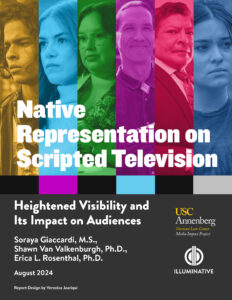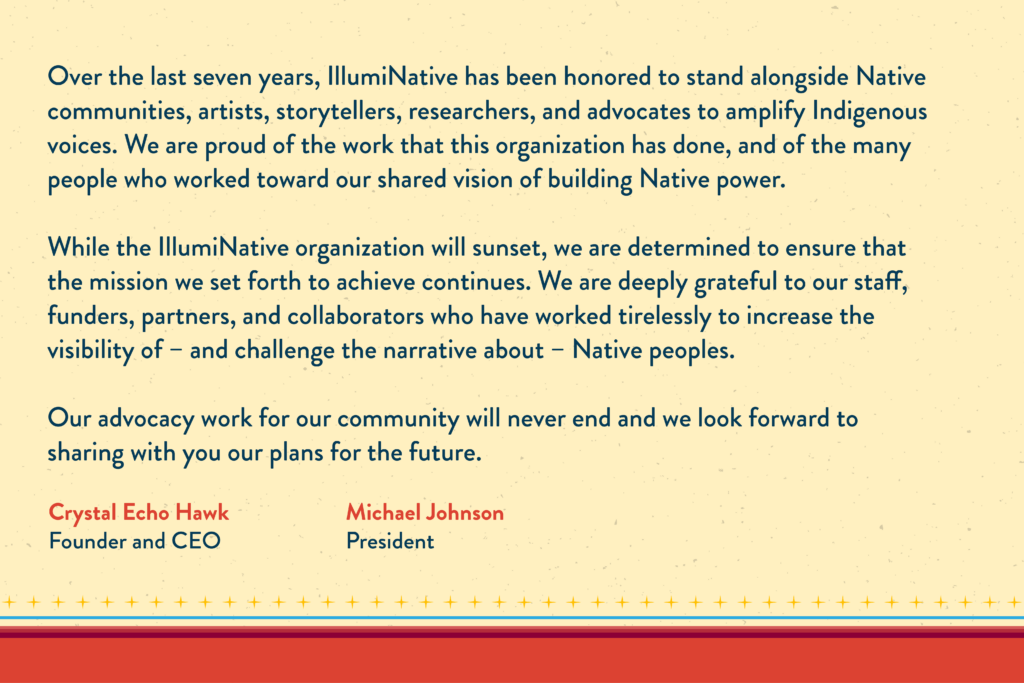STUDY SHOWS NATIVE-LED SERIES INFLUENCE REAL WORLD ATTITUDES AND POLICIES
On August 20, IllumiNative, in collaboration with USC Norman Lear Center’s Media Impact Project, released a groundbreaking report which analyzes stereotypical depictions of Native peoples on television and the impact these depictions may have on audiences.
The report, “Native Representation on Scripted Television: Heightened Visibility and Its Impact on Audiences,” offers an in-depth analysis of how these portrayals influence real-world attitudes towards Native issues.
Groundbreaking Report on Native Representation
Learn more about the powerful new findings revealed in this new report, the culmination of an in depth look at the contemporary portrayals of Natives in scripted television.
A Shift in Representation
Historically, Native characters in television and film have often been reduced to harmful stereotypes, reinforcing negative perceptions of Native peoples. This report takes a closer look at Native representation in modern entertainment, analyzing 51 television series that aired new episodes between 2020 and 2022. The study dives into how these portrayals impact audience perceptions, knowledge, and support for social issues affecting Native communities.
The research highlights the stark contrast between Native-led shows, such as Rutherford Falls and Reservation Dogs, and non-Native led productions like Yellowstone. The findings are telling – viewers of Rutherford Falls were more likely to agree that the U.S. should honor treaty obligations that enable Natives to control their lands, while Yellowstone viewers were less likely to support this stance. This difference in audience perception underscores the critical role that Native creatives play in shaping authentic and impactful narratives about their communities.
The Power of Authentic Storytelling
When Native talent leads both on-screen and behind the scenes, the quality of representation significantly improves, earning greater critical acclaim and resonating more deeply with audiences. This, in turn, fosters a more informed understanding of Native issues.
Crystal Echo Hawk, Founder and CEO of IllumiNative, emphasizes the importance of Native-led storytelling in combating stereotypes,“This analysis reaffirms our long-held belief that when non-Native people tell our stories – even those that may be well-intentioned – there’s a high risk that these stories will ultimately diminish Native autonomy or further stereotypes of our communities. In order to tell stories that authentically represent the complexities and breadth of Native experiences, Hollywood must prioritize productions with Native talent in key decision-making roles.”
The Real-world Impact
The report also explores the real-world implications of these on-screen narratives. For instance, Reservation Dogs featured a storyline about a Native teenager placed in a non-Native youth home, which had a tangible impact on viewers’ support for the Indian Child Welfare Act (ICWA). This policy, crucial for keeping Native children with Native families, was recently upheld by the U.S. Supreme Court. The study found that viewers of this series were more likely to support ICWA than non-viewers, illustrating how media can influence public opinion and policy.
Soraya Giaccardi, Senior Researcher at the USC Norman Lear Center’s Media Impact Project and lead author of the report, notes, “Our content analysis points to some exciting trends in contemporary Native depictions, while our impact study really illustrates how powerful these on-screen narratives can be. Not only was viewing series with prominent Native characters associated with knowledge of and beliefs about Native communities, but also with support around very concrete present-day issues, such as the Indian Child Welfare Act (ICWA) or ending the use of Native appropriation in sports.”
Moving Forward: The Future of Representation
While the report paints a mostly positive picture of current Native representation on television, it also sounds a note of caution. Of the 51 series analyzed, 34 have since ended, and only a handful of the renewed series continue to involve Native talent behind the scenes. The potential decline in Native-led storytelling could reverse the progress made in recent years.
When Native stories are told by Native voices, they not only entertain but also educate, challenge stereotypes, and influence real-world attitudes and policies. As Hollywood and the broader entertainment industry continue to evolve, it is imperative to prioritize and amplify Native talent.
The study, supported by a grant from the Robert Wood Johnson Foundation, calls for continued investment in Native talent and stories to ensure that Native representation on television remains authentic, nuanced, and impactful.
Take Action
You can help elevate the report findings by downloading our social media toolkit and sharing it with your network. Repost, spread the word, and join us in supporting authentic Native representation in television!



